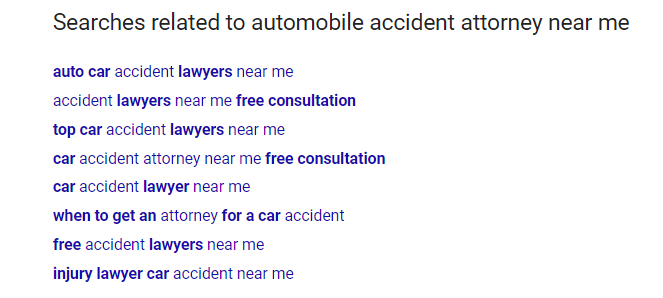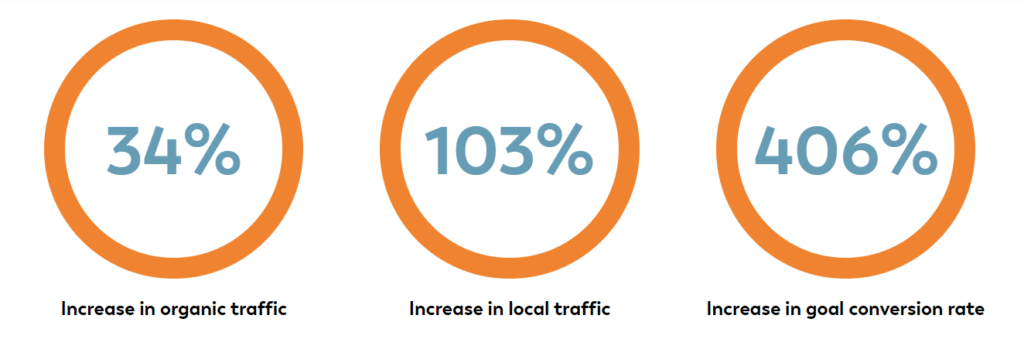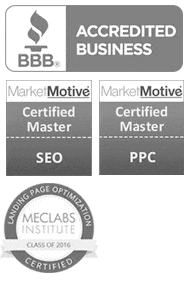At its simplest, doing keyword research for your law firm allows you to find the terms that potential clients are using to locate the legal services they need. After you conduct your research, you strategically use those keywords in the content you write for your firm’s website. By using proven techniques, your site can rank more highly in search results for the terms that matter most, helping you to increase better-qualified leads.
Google’s formula for ranking pages for keywords is based on a complex algorithm. So, to rank well, how you optimize your website must meet the always-evolving requirements of Google, while still providing your clients and prospects with the helpful information they need in a user-friendly manner. As requirements evolve, though, finding and using the best keywords remains at the heart of organic attorney search engine optimization (SEO).
You can find a more comprehensive look at law firm optimization in our SEO for lawyers guide. In this post, we’re focusing specifically on the nuts and bolts of the keyword research and selection process for attorneys.
Basics of Keyword Research
The keywords you choose should:
- be relevant to the legal services you provide
- be highly targeted (don’t try to rank for just “attorney” or “lawyer”)
- have steady-to-good levels of traffic
- have levels of competition that are achievable
As you conduct your keyword research, you’ll want to find terms with commercial intent. These may have less traffic than broader terms you’ll find, but you can rank more easily for them. Plus, because keywords with commercial intent are ones where people are actually looking for legal services (rather than simply searching for information), you’ll likely convert at a much higher rate when using commercial-intent keywords.
The image below shows a keyword from someone who is clearly considering suing a nursing home for neglect, and it has a search volume that averages 40 searches per month:

The next image shows a broader term:

The 390 people who search for this term each month are looking to hire someone who provides legal services in Florida. Thus, this is also a keyword with commercial intent. The difference is “Florida legal services” has a very broad potential (there are probably hundreds of legal services available in Florida) whereas ‘sue a nursing home’ has a fairly narrow legal intent (i.e., elder abuse or something similar).
In your research, look for keywords that have research/educational intent as well. People who search using these terms want solutions to problems they’re experiencing, so the terms often include “why” or “how.” These keywords can be used in blog posts, case studies, videos, and white papers.
People searching keywords with research intent might not be ready to hire an attorney, but positioning your law firm as one that provides quality solutions can be a good lead-nurturing strategy. Plus, when you use these keywords in engaging content that educates and informs, it’s more likely that people will share this content with others, spreading the reach of what you write.
You can find keywords with both commercial and research intent—and their associated traffic—by using professional tools. Some of them offer free access, in full or in part; but, for more sophisticated usage, you’ll likely need to pay for a subscription or outsource the keyword process to experts who offer SEO services for law firms.
We’ll get into more detail about keyword research tools later in this post. For now, we’ll just say that it can make sense to explore which tools are currently available for a free trial period to see what you think of them. This is a short-term solution (SEO is a long-term, ongoing process), but one that can help you see which tool works best for your law firm.
How to Create a List of Keywords
Note that we’re sharing a strategy for creating a list of keywords for organic SEO, rather than for pay-per-click (PPC) keyword research. If you’re looking for information about PPC for your law firm, review our PPC and Adwords advice here.
To create an organic keyword list, make a list of the services you offer (these should dovetail with the service pages on your site) and prioritize them in importance to make sure you give your more profitable services the lion’s share of your resources.
For each of your service areas, you’ll want to find relevant keywords with:
- commercial intent (personal injury lawyer, social security disability attorney)
- research intent (what is considered nursing home neglect, questions to ask an estate planning attorney)
- localized intent (Florida legal services, Jacksonville law firm)
One quick and easy way to expand your keyword list is to enter each of your broader terms into the Google search box to see what additional terms are auto suggested. Add relevant ones to your list. You can also enter these additional terms into Google to see if even more useful terms are auto suggested.
Here’s another convenient free way to seed your list. Let’s say that you want to include “automobile accident attorney near me” in your keyword list. Enter it into Google and then scroll to the bottom of the search engine results page to see what other terms Google suggests.

When creating your list, you can also use free tools like Google Suggest, QuestionDB, Soolve, WordStream and Ubersuggest. Plus, it makes sense to check your Google Search Console to see which terms are already sending people to your law firm’s site.
Once you create a seed list of keywords, you can enter each one into a keyword research tool to see how much traffic each one has. When you do that, also look to see what related keywords the tool suggests and the monthly traffic figures for those terms. Although they may not all be relevant, it’s likely that many are, so capture the ones that fit your law firm’s offerings.
Through this process, you’ll come up with a core list of keywords that you can use on pages and posts on your attorney website. It isn’t unusual to need to do more research when you’re writing blog posts, especially if the topics are somewhat different from what you’ve written about in the past.
Best Keyword Research Tools
There are plenty of keyword research tools to choose from. Here are just a few, organized in alphabetical order.
If there are free trials available, experiment with a variety of them. You can also read online reviews of the tools and ask for recommendations from other legal professionals who might be willing to share their experiences with the keyword research tools.
How to Choose the Best Keywords For Your Law Firm
For each service that you offer, it’s important to include the following in your foundational keyword list:
- broader keywords: examples might include “automobile accident attorney” and “medical malpractice lawyer”
- longtail keywords: examples might include “what does power of attorney mean” and “best social security attorneys near me”
- local keywords: “Florida automobile accident attorney” and “Jacksonville personal injury attorney”
As we mentioned near the beginning of this post, choose keywords that are relevant to your law firm, with steady to good traffic and manageable levels of competition.
Longtail keywords are typically less competitive, therefore helping your law firm to benefit from quicker traffic wins while building up credibility in Google for the more competitive ones in your keyword mix.
Local keywords can strengthen location pages on your site that describe the services you offer at each of your offices and otherwise send location-specific cues to Google.
How Often to Redo Keyword Research for Your Law Firm
It’s probably enough for your law firm to redo its keyword research once or twice a year. Unless you add new legal services in between or new laws take effect, reviewing your keywords every six months or so should be sufficient.
When you double-check your keywords, check to see if monthly search figures have gone up or down for them. If the search volume for a term is significantly going down, try to reverse engineer why and use your keyword research tool to see what related terms are being used by clients and prospects, instead. Once you have an idea of what changes need to be made, you can tweak your copy accordingly.
When redoing your research, re-enter your core terms into Google’s search bar, too, to see whether the auto suggests change. What about the related terms found at the bottom of the search page?
Regularly check your Google Search Console throughout the year to see which of your keywords are sending the most organic traffic to your site.
Metrics to review include:
- page impressions
- page clicks
- page clickthrough rates
- query clicks
- query clickthrough rates
- total clicks
What surprises did you find? How will that impact how you use keywords in your pages and posts going forward? What topics need more content to give important keywords more oomph? What pages and posts might need edited?
How to Review What Competitors Are Doing
Keyword research tools often give you the ability to review rankings of your competitors, as well. As just two examples, SEMrush and SpyFu are robust tools for competitor analysis.
Although it might be tempting to just do searches in Google for various terms to see where you and your competitors rank, Google personalizes searches in a way that skews this data. A study shows that, even when you search in incognito mode, skewing occurs; so, for more accurate data, use professional tools to gather this information.
Armed with the knowledge of competitor rankings, you can see which keywords they’re ranking well for where you’d like to have high visibility. You can then use those insights to reverse engineer what competitors are doing on their sites to achieve those rankings.
You may discover that you need to develop more content around those keywords, or it may mean that you need to make the content you already have more in-depth and robust. Or, maybe you’ll need to do both.
To help, here are insights into longform content and the role it plays in ranking for desired keywords. The takeaway: It’s important for your law firm to focus on creating something better than what’s out there in your space, particularly ensuring your content is better than the content your competitors are writing.
Not all keywords that your successful competitors are ranking for are necessarily important to you, but you can still use what you learn to help discover how they’re using attorney search engine marketing techniques to get leads—and that information can be invaluable, even when some of their keywords aren’t relevant for your law firm.
More Tips For How to Research Law Firm Keywords
When brainstorming keywords, blog topics, and more, put yourself in the position of your clients, rather than considering them from the mindset of a legal professional. What are the concerns of someone, say, whose loved one is being neglected in a nursing home? Or someone who was injured in a motorcycle accident through no fault of their own?
What questions might these potential clients have? What keywords might they be typing into a search engine to find solutions to the problems they’re experiencing?
This is where persona creation can come in handy. A client persona is a fictional character that can help you attract targeted traffic to your website, including when you’re in the keyword research stage of the process.
As an often overlooked strategy, also talk to people who work for your law firm, including those who answer the phone. What questions are they commonly asked? If those staff members look at your law firm’s content, does it address those questions?
You can also check out websites where people ask legal questions to gain insight into the types of issues that people seek information about. For example, if you’re a child custody attorney, you can look at Avvo and Quora to see what child custody questions are being asked, and then answer them on your own site using keywords from your research.
Finally, it’s important to recognize when enough research is enough before you begin writing your content. Remember, you can revamp this list during your annual or biannual keyword review.
Need Help? Contact DAGMAR Marketing Pros
When one estate planning law firm contacted us, their team shared how they wanted to boost their website rankings for estate litigation terms along with other terms from higher-profit practice areas. Our customized SEO strategy had the following results:

Contact us online or by phone at 904-270-9778 to let us know how we can help your law firm.
Chris Gregory
Latest posts by Chris Gregory (see all)
- LLMO vs AI SEO vs AIO vs GEO: The Ultimate Acronym Smackdown - December 30, 2025
- How to Optimize Your Website for AI Search: Strategies & Tactics That Work - September 23, 2025
- The Digital Marketing Playbook for Plastic Surgeons: Where to Start, What to Measure, and How to Win - July 23, 2025


Leave a Reply